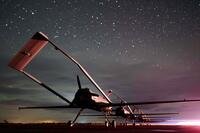The medium-altitude MQ-9B SkyGuardian drone will make its first ever trans-Atlantic flight to the Royal International Air Tattoo in the U.K. next month, General Atomics announced on Monday.
The long-endurance remotely piloted aircraft is scheduled to fly from the company's flight test center in Grand Forks, North Dakota, to RAF Fairford in Gloucestershire, U.K. the company said in a release.
General Atomics will "demonstrate a new standard in RPA flight endurance" by flying the SkyGuardian across the Atlantic in honor of the Royal Air Force's centennial celebration, said Linden Blue, CEO of General Atomics Aeronautical Systems.
"Given the distinguished 100 year history of the RAF, we believe that this flight is an appropriate way to celebrate the RAF's position as a leader in innovation," Blue said in a release.
Related content:
- Airmen Phase Out Predator in Move to MQ-9 Reaper
- Air Force Seeks to Change How Drone Pilots Train, Fly
- The Air Force's Newest MQ-9 Reaper Drone Is Now Hunting ISIS
MQ-9B is the latest version of General Atomics' multi-mission Predator B fleet, and a variant of its maritime intelligence, surveillance and reconnaissance SeaGuardian, the release said. The RAF plans to buy the SkyGuardian as part of its PROTECTOR RG Mk1 program, it said.
Recent tests of the SkyGuardian show the drone can fly nonstop for more than 48 hours, surpassing its projected max endurance of 40 hours, officials said.
In comparison to its MQ-1 Predator and MQ-9 Reaper cousins, the MQ-9B, which can fly roughly 240 miles per hour, has been tailored to withstand more damage and weather conditions, including ice, and has been incorporated with more robust flight control software, according to General Atomics' description of the drone.
The SkyGuardian would also be able to fly even in the event of a bird or lightning strike.
The drone has been tested to meet requirements from the UK Military Airworthiness Authority (MAA), the U.S. Federal Aviation Administration, and will also meet NATO standard certification, officials have said.
"Type-certification, together with an extensively tested collision avoidance system, will allow unrestricted operations in all classes of civil airspace," the release said.
-- Oriana Pawlyk can be reached at oriana.pawlyk@military.com. Follow her on Twitter at @oriana0214.










